
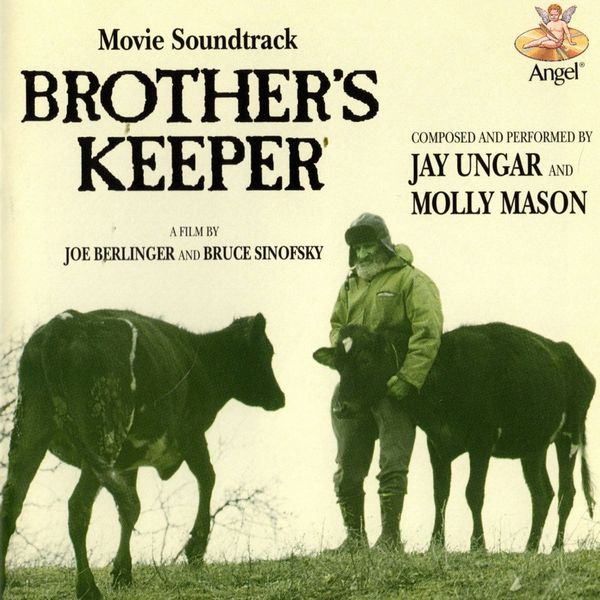 |
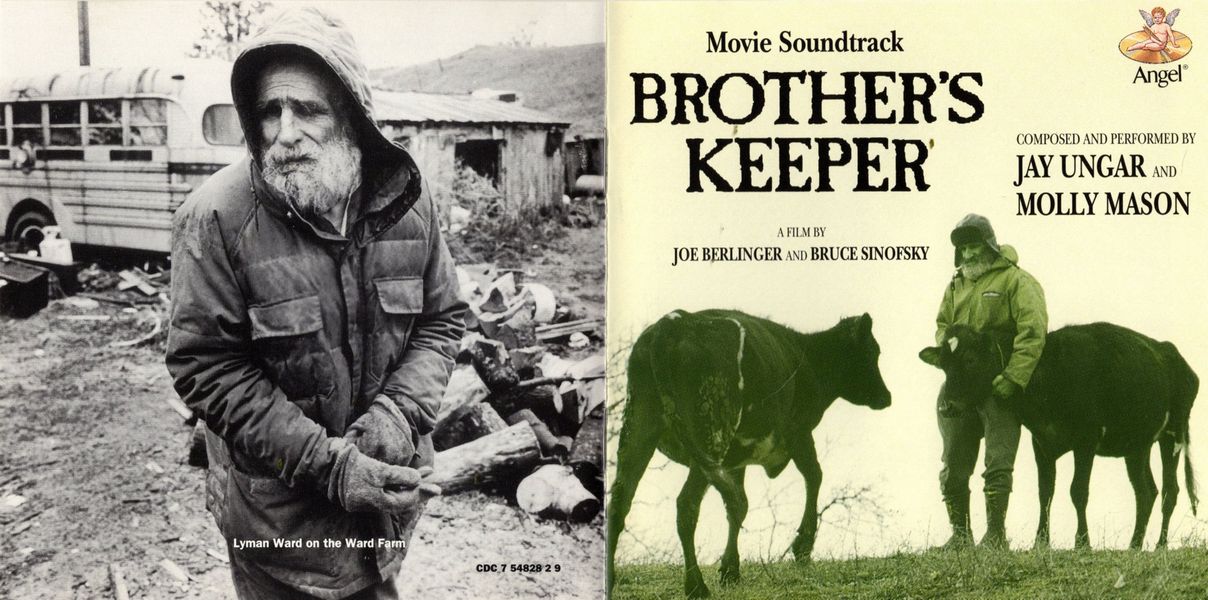
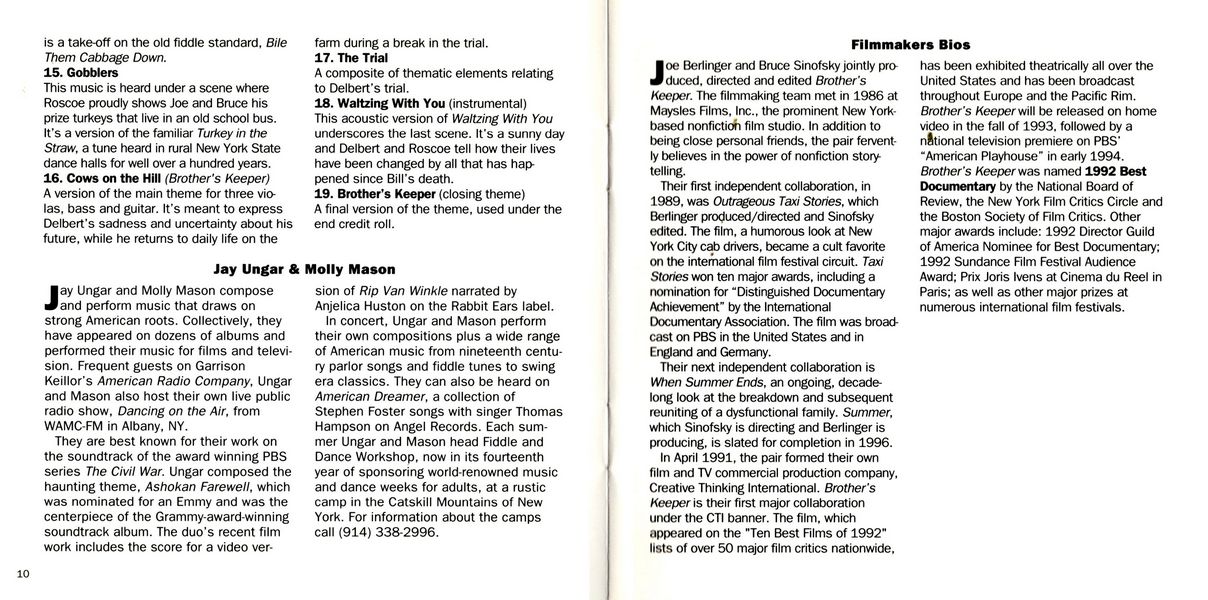 |
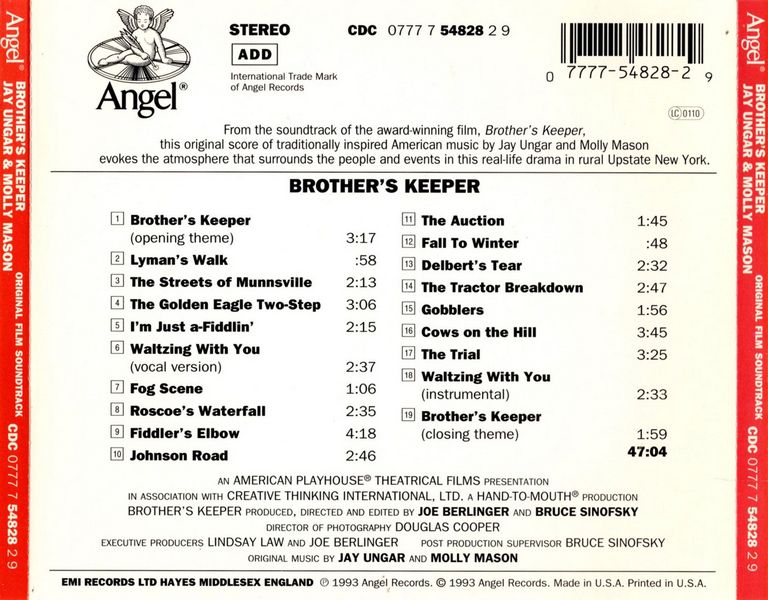
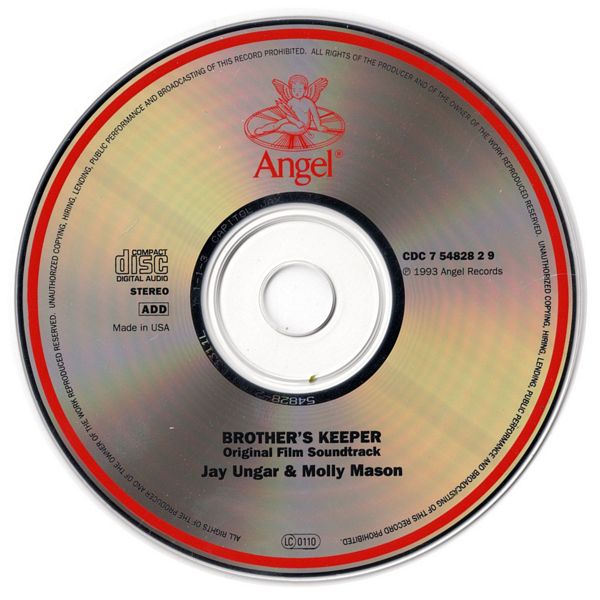 |
| more images |
Sleeve Notes
Introduction from Jay Ungar and Molly Mason
In June of 1990, after many years of television-free living, we bought a combination TV/VCR to watch Ken Burns' documentary The Civil War. We'd worked with Ken on music for the series and had just received a set of the videos. Before putting in a tape we turned on the TV to see what we could pick up out here in New York's Catskill Mountains. The first image we saw was Delbert Ward, an elderly Upstate New York dairy farmer, being led into jail on suspicion of murdering his brother Bill. Watching the story, we both felt sympathy and concern for Delbert and his two surviving brothers who lived with him. We hoped to hear more about them, but somehow never did. Not until August 1991, that is.
It was then that Joe Berlinger and Bruce Sinofsky asked us to do the music for their documentary film, Brother's Keeper. As they told us the story it seemed strangely familiar. Suddenly, we connected it with the news report we'd seen on TV more than a year before. Joe and Bruce overnighted to us some rough footage from the many hours of scenes they'd filmed and we were completely drawn in by the straightforward honesty and perceptiveness of the people of Munnsville, a town less than three hours from where we live. Joe and Bruce, along with cinematographer Doug Cooper, were making a truly exceptional and inspiring film.
A glimpse into a community where human values that are fast disappearing elsewhere seem to have remained intact.
A month later we finally met Joe and Bruce and felt a natural rapport. We shared the notion that the music should express the emotions contained in Brother's Keeper, while somehow reflecting something of the people and the region. Without hesitation, we signed on.
We love traditional American country music and have played our share of square dances, parties and roadhouses in rural Upstate New York, but it still seemed a tall order to compose and arrange music to tastefully underscore live footage of real peoples' lives. We decided to visit Munnsville and meet the people first hand.
Our first stop was John Teeple's shop — a wonderful combination of flea market and general store. John, the Ward brothers' closest neighbor, was friendly and encouraging. He told us how to find the Ward farm and urged us to drive right up and introduce ourselves to Delbert, Lyman and Roscoe. Molly bought a few 1950's and 60's classics from John's used record bin and we were off to meet the Ward brothers.
It was a grey October afternoon as we drove past vivid fall foliage, brown fields and old barns and farm houses along roads that had seen little change in the last fifty years. We reached the Ward homestead at the end of Johnson Road, on a ridge surrounded by beautiful rolling countryside. Delbert, Roscoe and Lyman were all standing in the yard when we arrived and they greeted us warmly. Within a couple of hours their nephew Moses and their friend Harry Thurston arrived to help with milking. After a while, we took out a fiddle and guitar and played music for Harry and the Ward brothers in the milk house. Their requests were mainly 1940's and 50's country songs by singers such as Kitty Wells and Hank Snow, and we played and sang as many as we knew. That evening we headed home, ready to begin work on the soundtrack.
The following morning Jay woke up, and watched a particularly moving scene from the Brother's Keeper footage. With renewed inspiration, he began playing a melody that would become the opening and closing theme. A few days later, Molly took her mandolin and a cassette recorder into the back room and came up with the tune for Waltzing With You. Then, we got together in the kitchen and wrote the Golden Eagle Two-Step. We were well on our way, and having a great time. And, as we'd hoped, the music grew out of the film. Every note of the soundtrack was performed scene by scene, while watching actual footage.
We enjoyed the project so much that it was ultimately frustrating to limit some of the musical selections to the length of a particular scene. Soon after Brother's Keeper's theatrical release, we began getting requests for a soundtrack album from such far-flung places as England and Australia. We presented the idea to Angel Records and this album is the result. While much of the music on this recording is straight from the soundtrack, it was truly a pleasure to be able to lengthen a few of the cuts and more fully develop some of our favorite themes. We hope you enjoy it as much as we have.
West Hurley, New York
February, 1993
About The Film Brother's Keeper
We got our first glimpse of the Ward Brothers in July of 1990, their weathered yet childlike faces staring out at us from The New York Times. After reading about their plight — that brother Delbert Ward had just been arrested for the murder of his brother Bill — we knew we had found our next film subject. For months, we had been searching for a special real-life situation to test our theory that we could create a nonfiction film simply by following real-life events as they literally unfolded before our cameras. We weren't interested in making just another television "documentary." Instead, we wanted to make a nonfiction film that would have the look, feel and narrative structure of a feature film, but which would be all the more captivating because it's real. And, we wanted our nonfiction feature film to play in movie houses all over America. The odds were certainly against us!
As we read The New York Times piece, Delbert's predicament touched us deeply. From an aesthetic standpoint, it fit the bill of what we were looking for — it seemed like a fascinating story was about to unfold which we could capture with our cameras without resorting to actors, narrators or scripts. Just as important, Delbert's situation seemed to touch upon some themes that were very important to us — community values, the fairness of the American justice system, and our ever-present desire to give a voice to segments of American society that are rarely, if ever, heard from in the American cinema. Armed with nothing more that a handful of credit cards, a copy of that The New York Times article and a minimum of equipment, a bare-bones crew of three — co-filmmakers Joe Berlinger and Bruce Sinofsky and cinematographer Douglas Cooper — we set out to capture a year in the life of murder defendant Delbert Ward and the community that rallied to his defense.
The film revolves around Delbert, Bill, Lyman and Roscoe Ward — "The Ward Boys," as they're known by their neighbors — four elderly, impoverished dairy farming brothers, then ranging in age from 59 to 71. These nearly-illiterate bachelor brothers never left the 99-acre dairy farm in central New York State which had been in their family for two centuries. Occupying the same dilapidated two-room shack all of their lives, they led a life that rural farmers might have led 200 years ago. Delbert and Bill even shared the same bed for as long as anyone could remember. The brothers' existence had been simple and quiet: their home had no indoor toilet, no telephone, no running water — very few of the amenities that twentieth century Americans take for granted.
On the night of June 6, 1990, however, their quiet life was shattered when Delbert's bed-mate, Bill, 64, died in his sleep. The next day, Delbert, 59, was arrested. By late evening, Delbert had confessed to suffocating Bill. For ten agonizing months, Delbert claimed he was innocent, despite the incriminating weight of his signed confession. Was he guilty? The townspeople believed in Delbert, asserting that he was coerced into signing a document he could neither read nor understand. As a result, they rallied behind him in an unusual demonstration of support, organizing a grassroots effort to help Delbert defend himself. At the bail hearing, the town pledged the required $10,000 bond within ten minutes to end Delbert's twenty-day ordeal in jail.
For almost a year, their grassroots efforts also included fundraising dinner dances, door-to-door collections and raffles. "Delbert Ward Defense Fund" collection tins dotted the countertops of the handful of stores that comprise the small, rural town of Munnsville (population: 499). Delbert's supporters also retained a private investigator and a high-profile Syracuse lawyer to handle Delbert's defense. After months of tension-fraught delays, the trial began on March 18, 1991 and lasted three weeks. Although Delbert was ultimately acquitted, each side presented a compelling case, raising many questions and issues, some of which remain unanswered today.
Brother's Keeper reveals this real-life murder mystery as it unfolded before our cameras. Ever since Delbert was first arraigned on a single count of second-degree murder, we were there to capture on film all of these events as they really happened — from actual courtroom drama to reflective moments in the brothers' cow-barn; from lively village fundraisers to intimate dinnertime conversations between key participants in this strange yet uniquely American drama. Throughout it all, we did not forget to film the brothers as they lived their lives — haying, milking, surviving.
For over nine months, we shot this film during evening and weekend hours because we had full-time production jobs in New York. The months of perseverance and faith in our subject paid off: With most of Delbert's story "in the can," we presented some of the forty or so hours of footage that we had filmed to the national PBS series "American Playhouse." The folks at "Playhouse" — Lindsay Law, Lynn Holst and Nicholas Gottlieb — were impressed with what they saw.
It was a daunting task to turn 55 hours (including the trial) of raw dailies into a compelling two-hour motion picture. During a lunch break, we noticed a story in Rolling Stone magazine about Jay Ungar and Molly Mason and their penchant for turn-of-the-century Adirondack acoustic fiddle music. Familiar with Jay and Molly's work on Ken Burn's documentary The Civil War, it occurred to us that their haunting and lyrical style would be a perfect complement to Brother's Keeper. An original score of their Adirondack music would help us to achieve our goal of creating a nonfiction film rich in dramatic structure without compromising the truthfulness of the material being presented.
It was a rare and special privilege to collaborate with Jay and Molly on the soundtrack for Brother's Keeper. Many people advised us against the use of an original music score in a nonfiction film for fear of blurring the film's objectivity by heightening the dramatic tension at the expense of the "Truth." We're glad we didn't listen to that advice. Far from affecting the "Truth" contained in the film, the music in Brother's Keeper instead becomes an emotional catalyst, helping to reveal to the viewer (and listener) some fundamental truths about American society and the human condition, which to us are the only truths that matter.
The success of Brother's Keeper has been especially gratifying — the film has played in movie theaters throughout the United States. Millions more have seen the film on television all over Europe and Asia. The Wards are our special friends, and it gives us great pleasure to have shared this friendship with so many people. We will always have a very warm place in our hearts for the Ward Brothers and the people of Munnsville, a bond that we hope all of you will feel, too. If you're ever in central New York State, stop by the farm — they'll be glad to meet you.
Joe Berlinger and Bruce Sinofsky
(Notes by Joe Berlinger)
New York City
February, 1993
Notes About The Music
Brother's Keeper (opening theme) — Jay wrote this piece the morning after he and Molly visited the Ward brothers farm in October of 1991.
Lyman's Walk — A version of Fiddler's Elbow, written by Jay in the mid-70's. He named it for Fiddlers Elbow Road in New York's Dutchess County. The Road is, "crooked as a fiddler's elbow," and so's the tune. Fiddler Monica Strauss liked it and immediately learned it from Jay, who just as promptly forgot the tune. Luckily, Monica taught it back to him fifteen years later, just in time to be used as Lyman's Walk.
Streets of Munnsville — A two-guitar piece reminiscent of 1920's and 30's country music, played in a simple front porch style.
The Golden Eagle Two-Step — Written to sound like a 1950's country classic, Molly and Jay composed this one morning In their kitchen and named it after the (Golden Eagle, the site of Delbert's fund-raiser. They're joined by Woodstock musicians "Fooch" Fischetti and Peter O'Brien who help them get that Upstate New York "country roadhouse" sound.
I'm Just a-Fiddlin' — One of Jay's old standbys, this melody, heard In the square dance scene, is taken from the old-time fiddle tune Dinah.
Waltzing With You (vocal version) — Molly wrote this one for Delbert, who at age 60, danced for the first time in his life at his own benefit party. Joining in, once again, are Peter and "Fooch" on drums and pedal steel.
Fog Scene — A mood piece derived from the Brother's Keeper theme that underscores a scene showing Delbert walking in the fog, while we hear ominous dialogue from the trial.
Roscoe's Waterfall — This piece was inspired by a beautiful scene that never made the final cut. In it, Roscoe leads filmmakers Bruce and Joe through golden autumn woods, to a pristine waterfall where he recounts memories of good times spent there in his younger days.
Fiddler's Elbow — The fuller arrangement of the melody used for Lyman's Walk.
Johnson Road — This tune underscores a shot of the Ward brothers riding to town on their tractor.
The Auction — The livestock auction begins just after Delbert's attorney, Ralph Cognetti, says that he hopes the recent changes in Delbert, brought on by all the media attention, don't make him appear to be "too schooled in the ways of the world." The music starts with strains of the traditional fiddle tune, Ways of the World, then drifts into Chicken Reel and Little Rabbit before ending with the obligatory chicken sounds on the fiddle.
Fall to Winter — A short reprise of Waltzing With You that takes us from the crisp colors of fall to the bleak landscape and icy winds of winter.
Delbert's Tear — In reviewing the original soundtrack tapes, Jay, Molly and engineer, Chris Andersen, discovered a melodic fragment that had underscored Delbert wiping a tear from his eye in a scene that had been cut. Intrigued by the sound, they began playing the bit of melody on mandolin and guitar, and Delbert's Tear soon emerged.
The Tractor Breakdown — Lyman kicks this one off with four hits on the battery terminal of his tractor. The tune is a take-off on the old fiddle standard, Bile Them Cabbage Down.
Gobblers — This music is heard under a scene where Roscoe proudly shows Joe and Bruce his prize turkeys that live in an old school bus. It's a version of the familiar Turkey in the Straw, a tune heard in rural New York State dance halls for well over a hundred years.
Cows on the Hill (Brother's Keeper) — A version of the main theme for three violas, bass and guitar. It's meant to express Delbert's sadness and uncertainty about his future, while he returns to daily life on the farm during a break in the trial.
The Trial — A composite of thematic elements relating to Delbert's trial.
Waltzing With You (instrumental) — This acoustic version of Waltzing With You underscores the last scene. It's a sunny day and Delbert and Roscoe tell how their lives have been changed by all that has happened since Bill's death.
Brother's Keeper (closing theme) — A final version of the theme, used under the end credit roll.
Jay Ungar and Molly Mason
Jay Ungar & Molly Mason compose and perform music that draws on strong American roots. Collectively, they have appeared on dozens of albums and performed their music for films and television. Frequent guests on Garrison Keillor's American Radio Company, Ungar and Mason also host their own live public radio show, Dancing on the Air, from WAMC-FM in Albany, NY.
They are best known for their work on the soundtrack of the award winning PBS series The Civil War. Ungar composed the haunting theme, Ashokan Farewell, which was nominated for an Emmy and was the centerpiece of the Grammy-award-winning soundtrack album. The duo's recent film work includes the score for a video version of Rip Van Winkle narrated by Anjelica Huston on the Rabbit Ears label.
In concert, Ungar and Mason perform their own compositions plus a wide range of American music from nineteenth century parlor songs and fiddle tunes to swing era classics. They can also be heard on American Dreamer, a collection of Stephen Foster songs with singer Thomas Hampson on Angel Records. Each summer Ungar and Mason head Fiddle and Dance Workshop, now in its fourteenth year of sponsoring world-renowned music and dance weeks for adults, at a rustic camp in the Catskill Mountains of New York.
Filmmakers Bios
Joe Berlinger and Bruce Sinofsky jointly produced, directed and edited Brother's Keeper. The filmmaking team met in 1986 at Maysless Films, Inc., the prominent New York-Imsud nonfiction film studio. In addition to being close personal friends, the pair fervently believes In the power of nonfiction storytelling.
Their first Independent collaboration, in 1989, was Outrageous Taxi Stories, which Berlinger produced/directed and Sinofsky edited. The film, a humorous look at New York City cab drivers, became a cult favorite on the international film festival circuit. Taxi Stories won ten major awards, including a nomination for "Distinguished Documentary Achievement" by the International Documentary Association. The film was broadcast on PBS in the United States and in England and Germany.
Their next independent collaboration is When Summer Ends, an ongoing, decade-long look at the breakdown and subsequent reuniting of a dysfunctional family. Summer, which Sinofsky is directing and Berlinger is producing, is slated for completion in 1996.
In April 1991, the pair formed their own film and TV commercial production company, Creative Thinking International. Brother's Keeper is their first major collaboration under the CTI banner. The film, which appeared on the "Ten Best Films of 1992" lists of over 50 major film critics nationwide, has been exhibited theatrically all over the United States and has been broadcast throughout Europe and the Pacific Rim. Brother's Keeper will be released on home video in the fall of 1993, followed by a national television premiere on PBS' "American Playhouse" in early 1994. Brother's Keeper was named 1992 Best Documentary by the National Board of Review, the New York Film Critics Circle and the Boston Society of Film Critics. Other major awards include: 1992 Director Guild of America Nominee for Best Documentary; 1992 Sundance Film Festival Audience Award; Prix Joris Ivens at Cinema du Reel in Pans; as well as other major prizes at numerous international film festivals.